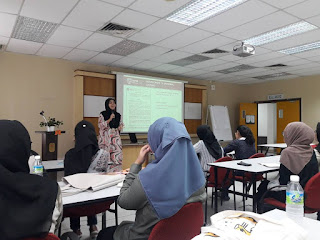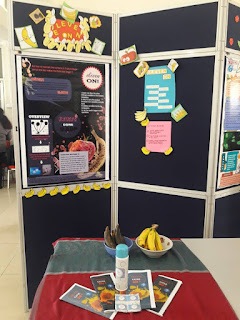E-Portfolio Microbiology II Week 7
On
30th April 2018, a group of students from Bachelor of Microbiology
has visited Institute of Bioscience, UPM. The purpose of us visiting IBS was to
learn more on culture collection as IBS actually provided services on culture
collection from all around Malaysia. This services were put under the Microbial
Culture Collection Unit or also known as UNiCC where samples from different
states in Malaysia were kept and preserved.
At
2.50pm, all of the students supervised by Mr. Syazwan and Miss Aina were
gathered at Bilik Tongkat Ali Emas for short briefing from Pn. Musliyana
Mansur, officer who was in charge of UNiCC. Basically, UNiCC was established on
2008 after the opening of IBS at 1996 where all the researches sample are
preserved. UNiCC was initiated in to maintain and manage a duplicate of
available microbial strains in UPM. UNiCC also aspires to provide strains for
researcher and teaching laboratories. The objectives of UNiCC are to establish
and maintain a microbial culture collection center using a standard system, to
provide safe deposition of microbial cultures for Malaysian researchers and industries
and also to stimulate and support the study and research work related to
microbial diversity and taxonomy in UPM.
From
the current data, UNiCC had about 1300 of total microbial cultures been
deposited with 350 cultures ready to be identified. These cultures are mainly
from Malaysian researches and also there are samples from overseas that
includes Japan and Thailand. The sample from UPM itself are mainly from Faculty
of Food Technology and Faculty of Biotechnology and Molecular Sciences. Both of
the faculties provide more than half of the cultures sample generally from
Malaysia.
The
funding for UNiCC are from 9th Malaysia Plan around the year of 2008
to 2010 where most of the funding includes equipment for the unit. This unit is
also funded by Edu Park, UPM that includes chemical substances, laboratory
materials and equipment. There is also some initiatives that this unit does in
order for them to be self-funded. UNiCC also have been collaborated with some
of renowned culture collection centre like The National Center for Genetic
Engineering and Biotechnology (BIOTEC) of Thailand and also the World
Federation for Culture Collections. These collaborations help them to be
recognize as international-level of culture collection centre. However,
Malaysia is way behind those countries like Thailand and Japan as the available
equipment can only support limited sample from all over Malaysia.
Generally,
UNiCC provides Safe Depository services. It is a service for researchers who
want to maintain important strains under a proper culture collection management
system. Most groups of bacteria, fungi and yeasts that are classified in Hazard
Group 1 or 2 are accepted. The service is completely confidential and recall or
distribution of cultures is carried out strictly according to the instructions
of the client. Viability testing of safe deposit cultures after prolonged
storage will only be performed upon depositor's requests.
Here
in IBS, UNiCC has separate laboratory for Bacteria and Fungi with the equipment
of freezer, freeze-dryer and chiller to keep the cultural samples. Safe
Depository will be charged with some service charges and the Public Depository
services is free of any charges as the sample can be distributed to other
researches with proper procedures.
Then,
we were taken to the laboratory area and the keeping are where all the cultures
were collected, properly labelled and kept in certain temperature. The staffs
were so friendly during our visits. This visit really teach me a lot on how
culture collections is so important and why is these centre are crucial for
future purposes. There will be some pictures attached below from our visits to
UNiCC.



Ulasan
Catat Ulasan